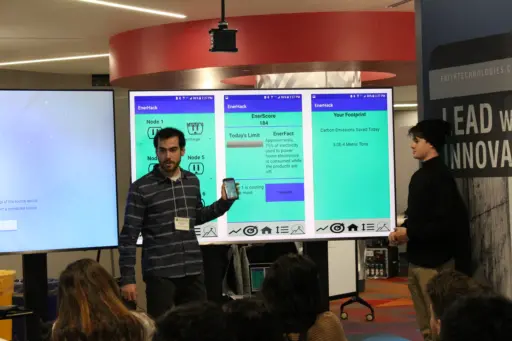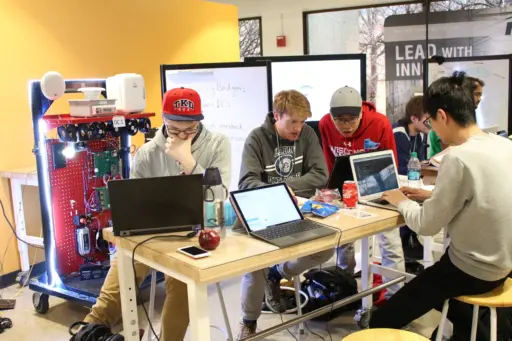Today’s technology can control any number of devices at the push of a button—yet for many people, conserving energy hasn’t gotten any easier.
Imagine being able to ask your smart speaker for real-time information about your home electricity usage and to offer suggestions about how to conserve power. Or, picture an app that identifies the best locations for solar panels on your roof, and then provides detailed data about potential power bill savings.
Those were just two of the many sustainability innovations that took the leap from idea to reality during a jam-packed weekend of programming, prototyping, and debugging at EnerHack, the first-ever University of Wisconsin-Madison energy hackathon.
 Matthew Kramer and Jack Long demonstrate their prototype of a points-based reward system to encourage energy conservation at the final pitching contest for the 2018 energy hackathon.
Matthew Kramer and Jack Long demonstrate their prototype of a points-based reward system to encourage energy conservation at the final pitching contest for the 2018 energy hackathon.
“It’s amazing to see what the teams accomplished in so short a time,” says Giri Venkataramanan, a professor of electrical and computer engineering at UW-Madison who organized the event with his PhD students Ashray Manur and David Sehloff.
Some of the teams at EnerHack had never worked on sustainable power before the hackathon—but that didn’t stop the eight groups of undergraduate and graduate students from coming together in the College of Engineering makerspace to build creative hardware and software solutions.
“We have a great blend of students from electrical engineering, some from computer science, and even from business,” says Manur. “I think that mix helps them be more creative because they look at problems differently.”
The weekend-long hackathon kicked off at 5 p.m. on Friday, April 13, 2018, and by the final pitches at 3 p.m. on Sunday, the participants had built everything from point-based smartphone apps for making conservation a fun “Fitbit-esque” challenge to home sensor networks that automatically reduce wasteful power consumption.
EnerHack put a unique spin on traditional hackathons (which are sprint-like intensive collaborative coding events that usually have an open-ended end-goal of creating useable software) by providing all the teams with an energy research and education platform called EnerGyan that Manur and Sehloff developed. Using EnerGyan, functionally an “energy grid in a box,” as a scaffold and starting point gave the students unprecedented chances to tinker with real-world hardware.
EnerHack was also the first hackathon in Madison with a strict focus on one problem: sustainable energy.
“When we work together, we really can solve important problems for our community and the world,” says Sehloff.
Teams competed for top prize in one of three categories—hardware, innovation, and social impact. The winning groups took home up to $1,000, but every participant left the event with at least a little bit of new knowledge and fresh perspectives. Some groups taught themselves the programming language Python on the fly, while others gained first-time experience working with real home hardware thanks to the components in the EnerGyan kit.
 Joshua Kuzminski, Huanran Li, Kieran Mulligan, and Chongxi Yuan, the winning team in the Social Impact category at EnerHack 2018 created an interface for using the Amazon EchoDot to control a home energy grid.
Joshua Kuzminski, Huanran Li, Kieran Mulligan, and Chongxi Yuan, the winning team in the Social Impact category at EnerHack 2018 created an interface for using the Amazon EchoDot to control a home energy grid.
“I love hackathons because you always learn something,” says Namrata Kogalur, a graduate student in electrical and computer who helped create a betting marketplace app with challenges designed to encourage more sustainable energy use.
Holding an energy hackathon in Madison has been a longtime dream for Venkataramanan, yet, until recently, logistical hurdles prevented such an event from seeing the light of day.
“Having the makerspace was so important,” says Venkataramanan, “We needed a place where the students could work all weekend and be able to rapid-prototype.”
Venkataramanan also noted that the tireless efforts of Manur and Selhoff, other student volunteers, and substantial help from Wisconsin Electric Machines and Power Electronics Consortium administrative director Helene Demont were also crucial to the event’s success.
That work—whether helping troubleshoot a buggy piece of code in person at 10 p.m. or ordering mountains of tortilla chips and guacamole to fuel late-night coding—did not go unappreciated.
“We’ve been to several hackathons, and this was by far the most seamless and one of the most fun,” says Sukanya Venkataraman, a graduate student in computer science.
The winning concepts were:
- Social Impact (Sponsored by Faith Technologies)
Alexa, am I powerful?—a smart digital assistant for a home power grid using the Amazon Echo Dot
- Innovation (Sponsored by Smart Wires)
Solaris—using forecasts and cameras to manage home solar energy systems based on cloud cover
- Hardware (Sponsored by the College of Engineering makerspace)
Context aware home—a sensor system that adjusts electricity consumption by dimming lights or turning off appliances in response to environmental cues
EnerHack was organized through a partnership between the UW-Madison College of Engineering and the makerspace and the Wisconsin Electric Machines and Power Electronics Consortium. Event sponsors included Faith Technologies, Smart Wires, Qdoba, Jimmy John’s, Papa John’s Pizza, and Glass Nickel Pizza Company.